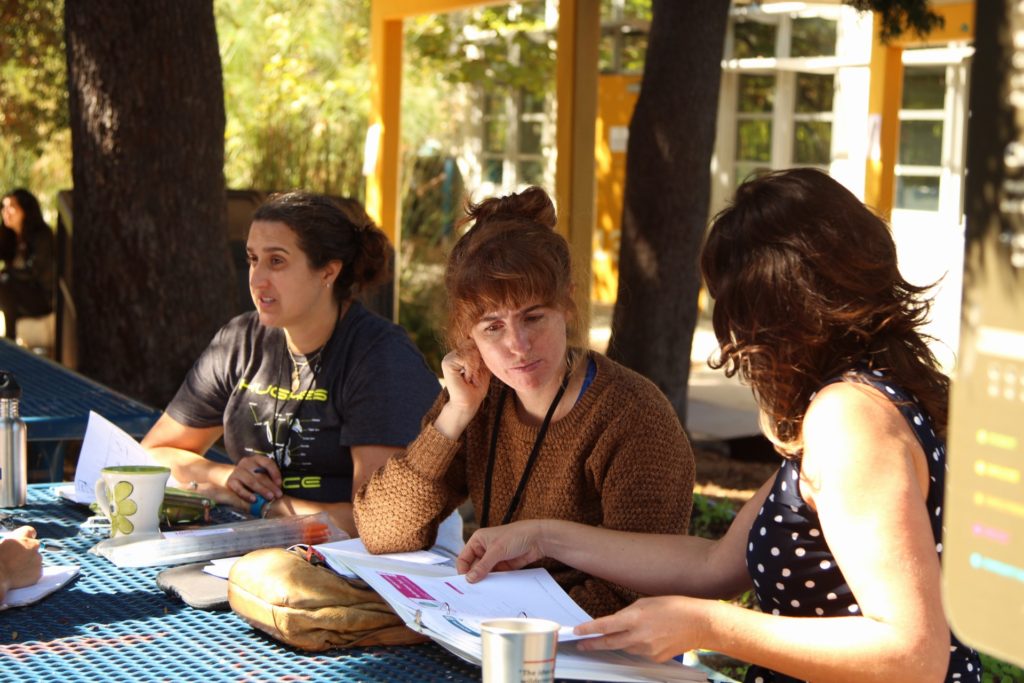
Educators from across Southern California attend workshops showcasing how local research projects can bring environmental change into the classroom… and community
“All of the sessions were so inspiring! There are so many tools that I’m taking back to my classroom to share with my students. Today event was invaluable! “
– GAI Attendee
Educators from school districts across Southern California — including LAUSD, Pasadena, Long Beach, Coachella Valley, Orange County and even Fresno — converged at Environmental Charter High School on October 3 to attend the first of its 2016-17 Green Ambassadors Institute, a 3-part professional development series of workshops and breakout collaboration sessions focused on the theme of ‘Research in Action.’ The day-long event focused on how K-12 educators can work with students and community to incorporate local environmental research into their curriculum and invite students to develop solutions.

A keynote presentation by Floridalma Boj Lopez, a doctoral candidate in USC’s Department of American Studies and Ethnicity, discussed how to engage students in local environmental issues through community-led research. Boj Lopez highlighted the hands-on research produced by the latest cohort of the Marina Pando Social Justice Research Collaborative, a program of East Yard Communities for Environmental Justice. In her talk she underscored the difference between environmentalism and environmental justice, and how mainstream environmental organizations do not prioritize issues like toxic pollution, food apartheid and air quality, which primarily affect low-income communities of color.
“Part of what environmental justice argues is that low income communities of color are disproportionately impacted by environmental pollution.” – Floridalma Boj Lopez
She also pointed out the disconnect between academia and the lived realities of first-generation college students. First-generation college students often cannot choose to take an unpaid summer internship over helping care for their families, and so are left out of opportunities to advance their academic careers. Interventions like the Marina Pando Social Justice Research Collaborative place first-generation undergraduate students at the center of knowledge creation, redefining who is “qualified” to produce research.
Boj Lopez stressed that communities of color are not just subjects of academic research, but are leaders in developing their own research questions and methodologies that address the environmental justice issues most impacting their communities.
Programs that affirm students’ identities and lived experiences and honor their capacity to lead relevant projects have contributed to transforming students’ relationship to “schooling” and higher education. This important framework was relevant to GAI participants, most of whom teach in underserved college-preparatory schools across the region, given that many of the students served are the first in their families to attend college. Everyone, not just academics, can be scholars and technical experts in their communities. Watch the full keynote here.
With Boj Lopez’s presentation as a framework for approaching environmental research, collaborative breakout sessions were held throughout the day underscoring how students and teachers can connect to relevant environmental advocacy, action and policy.

The theme ‘Research in Action’ aimed to engage educators from all subject areas in the value of research as a powerful underpinning of social change. Discussions from leading environmental groups and educators included:
- 5 Gyres Institute: Rachel Lincoln Sarnoff, Executive Director & Steph Whyte, Programs Manager, shared 5 Gyres’ on-the-ground research on plastic ocean pollution and its effects on humans and animals. Participants sorted and measured microplastics samples and discussed the upcoming federal microplastics ban.
- Samueli Academy: Teacher Vicente Perez shared how he uses research and project-based learning in a biology classroom and how making a link between STEM content and its use in the community has always been a challenge for many instructors because of resources. Attendees discussed how teachers can tap into issues of concern in their local community and raise student awareness by collecting data.
- Environmental Charter Middle School-Gardena: Teacher Sophie Korn had participants draw infographics by hand in small collaborative groups, and shared resources and lessons to introduce middle and elementary students to data and infographics in the classroom.
- LMU Center for Urban Resilience: Dr. Eric Strauss discussed how urban ecology is the study of the built environment and how organisms interact with it, change it and adapt to it. In particular, hands-on research is a great way for students to explore urban biodiversity and “do” real science that can be used to change their world. Watch the talk here.
- LA Maritime Institute: Captain John Kraus showcased his technique of “Charting Your Classroom with Math.” Using the navigation component of the Los Angeles Maritime Institute’s STEM focused TopSail Youth Program, Captain Kraus introduced attendees to the basics of navigation and putting math into a real-world setting.
- LA County Bicycle Coalition: Tamika L Butler, Executive Director, discussed ballot measure Measure M, how research informs — or doesn't inform — public policy and the ways that access to reliable transportation connects to every other social and environmental justice issue.

For the last half of the day, participants broke out into small collaborative groups to brainstorm ways to put their ideas into action through curriculum, minigrants and field trips. The Green Ambassadors Institute will award $300 minigrants to support the 2016-17 cohort in implementing environmental service learning projects with their students. These projects will be showcased at the final date on Saturday, May 6, 2017.
On Saturday, February 25, 2017 participants will reconvene for a hands-on look at the urban environment, using Los Angeles as a learning lab. Educators will choose one of three interactive field trips: a sail with the LA Maritime Institute and 5 Gyres, a bike ride with the LA County Bicycle Coalition, and a walking tour with the LA Conservancy. Join us!
See more photos from the event.
Originally published at www.ecsonline.org/green-ambassadors-institute-research-in-action

